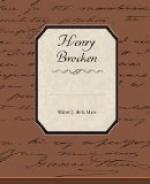“From childhood to this side regret,” I answered rather sadly.
“’Tis a sad end to a sweet tale,” she said, “were it but truly told. But yet, and yet, and yet—you may return, and life heals every, every wound. I must look on the ground and make amends. ’Tis this same making amends men now call ‘Purgatory,’ they tell me.”
“‘Amends,’” I said; “to whom? for what?”
“Welaway,” said she, with a narrow fork between her brows; “to most men and to all women, for being that Criseyde.” She gazed half solemnly at some picture of reverie.
“But which Criseyde?” I said. “She who was every wind’s, or but one perfect summer’s?”
She glanced strangely at me. “Ask of the night that burns so many stars,” she said. “All’s done; all passes. Yet my poor busy Uncle Pandar had no such changes, nor Hector, nor ... Men change not: they love and love again—one same tune of a myriad verses.”
“All?” I said.
She tossed lightly a little dust from her hand.
“Nay—all,” she replied; “but what is that to me? Mine only to see Charon on the wave pass light over and return. Man of the green world, prithee die not yet awhile! ’Tis dull being a shade. See these cold palms! Yet my heart beats on.”
“For what?” I said.
Criseyde folded her hands and leaned her cheek sidelong upon the stone.
“For what?” I repeated.
“For what but idle questions?” she said; “for a traveller’s vanity that deems looking love-boys into a woman’s eyes her sweeter entertainment than all the heroes of Troy. Oh, for a house of nought to be at peace in! Oh, gooseish swan! Oh, brittle vows! Tell me, Voyager, is it not so?—that men are merely angry boys with beards; and women—repeat not, ye who know! Never yet set I these steadfast eyes on a man that would not steal the moon for taper—would she but come down.” She turned an arch face to me: “And what is to be faithful?”
“I?” said I—“‘to be faithful?’”
“It is,” she said, “to rise and never set, O sun of utter weariness! It is to kindle and never be quenched, O fretting fire of midsummer! It is to be snared and always sing, O shrilling bird of dulness! It is to come, not go; smile, not sigh; wake, never sleep. Couldst thou love so many nots to a silk string?”
“What, then, is to change,... to be fickle?” I said.
“Ah! to be fickle,” she said, “is showers after drought, seas after sand; to cry, unechoed; to be thirsty, the pitcher broken. And—ask now this pitiless darkness of the eyes!—to be remembered though Lethe flows between. Nay, you shall watch even hope away ere another comes like me to mope and sigh, and play at swords with Memory.”
She rose to her feet and drew her hands across her face, and smiling, sighed deeply. And I saw how inscrutable and lovely she must ever seem to eyes scornful of mean men’s idolatries.




